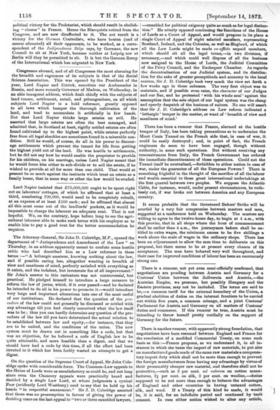The Attorney-General, Sir John D. Coleridge, M.P., opened the department
of "Jurisprudence and Amendment of the Law" on Thursday, in an address apparently meant to confute some hostile critic who had described him as a Law reformer in these terms :—" A lethargic amateur, knowing nothing about the law, and if possible caring less, altogether wanting in breadth of view and manliness of mind, perfectly satisfied with everything as it exists, and the indolent, but inveterate foe of all improvement." Sir John's answer to this caricature was not controversial, but practical. He pledged himself to introduce a large measure to reform the law of juries, which, if it ever passed—and he declared he intended to do all in his power to promote it—would introduce very large and important alterations into one of the most useful of our institutions. He declared that the question of the pro- cedure of the law could not generally be discussed or settled with any advantage till you had clearly conceived what the law itself was to be ; thus you can hardly determine any question of the pro- cedure of the law till you have determined the actual relation to be established between law and equity,—for instance, that they are to be united, and the conditions of the union. The new system must be drawn out in something like a code, but that was no objection, for he believed a code of English law to be quite attainable, and more feasible than a digest, and that we should have had a code by this time, if all the effort had been devoted to it which has been feebly wasted on attempts to get a digest.


































 Previous page
Previous page